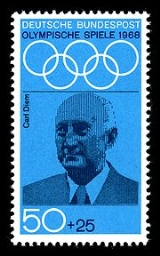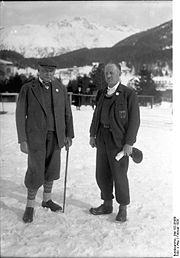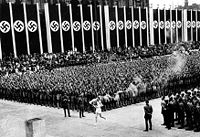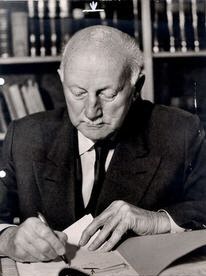
Carl Diem
Encyclopedia

Würzburg
Würzburg is a city in the region of Franconia which lies in the northern tip of Bavaria, Germany. Located at the Main River, it is the capital of the Regierungsbezirk Lower Franconia. The regional dialect is Franconian....
– December 17, 1962, Cologne
Cologne
Cologne is Germany's fourth-largest city , and is the largest city both in the Germany Federal State of North Rhine-Westphalia and within the Rhine-Ruhr Metropolitan Area, one of the major European metropolitan areas with more than ten million inhabitants.Cologne is located on both sides of the...
) was a German sports administrator, and as Secretary General of the Organizing Committee of the Berlin Olympic Games, the chief organizer of the 1936 Olympic Summer Games (sometimes referred to as the "Nazi Olympics").
He created the tradition of the Olympic torch relay
Olympic Flame
The Olympic Flame or Olympic Torch is a symbol of the Olympic Games. Commemorating the theft of fire from the Greek god Zeus by Prometheus, its origins lie in ancient Greece, where a fire was kept burning throughout the celebration of the ancient Olympics. The fire was reintroduced at the 1928...
, and was an influential historian of sport, particularly the Olympic games.
Career
Born into an upper-middle-class family, Diem was a middle- and long-distance runner as a teenager - unusual in a country where gymnastic-style athletics was fashionable, rather than what were known as "anglo-saxon" athletics. He showed an early gift for organizing, founding his first athletic club, called Marcomannia, in 1899. As a young man, Diem originally pursued a career in sales, but also began to write articles for sporting newspapers. At the age of twenty, he was hired by the German Sports Authority for Athletics (the Deutsche Sportbehörde für Athletik, or DSBfA), and a year later was elected to its board of directors. Diem was an ardent believer in the heroic Olympian ideal, and in the contributions that international sport could make to harmony between nations. In this regard, and many others, he was a fervent disciple of Pierre de CoubertinPierre de Coubertin
Pierre de Frédy, Baron de Coubertin was a French educationalist and historian, founder of the International Olympic Committee, and is considered the father of the modern Olympic Games...
, the founder of the International Olympic Committee
International Olympic Committee
The International Olympic Committee is an international corporation based in Lausanne, Switzerland, created by Pierre de Coubertin on 23 June 1894 with Demetrios Vikelas as its first president...
and father of the modern international Olympiad. In 1906 Diem began his long Olympic career, leading the German contingent of athletes to the Athens games (for reasons that are not entirely clear, the German delegation actually entered the stadium first in the parade of athletes). In 1909, the games for the summer of 1912 were awarded to Stockholm, but the IOC made it clear that Diem and his fellow organizers could expect to hold the 1916 games in Berlin. In 1912 he initiated the award of the German Sports Badge
German Sports Badge
The German Sports Badge is a decoration of the German Olympic Sports Federation DOSB, of the Federal Republic of Germany...
, following the example of a Swedish award encountered during the Stockholm Olympics
1912 Summer Olympics
The 1912 Summer Olympics, officially known as the Games of the V Olympiad, were an international multi-sport event held in Stockholm, Sweden, between 5 May and 27 July 1912. Twenty-eight nations and 2,407 competitors, including 48 women, competed in 102 events in 14 sports...
.

World War I
World War I , which was predominantly called the World War or the Great War from its occurrence until 1939, and the First World War or World War I thereafter, was a major war centred in Europe that began on 28 July 1914 and lasted until 11 November 1918...
erupted; the Berlin games were subsequently cancelled. Diem enlisted in the German army and served in Belgium and France. He was wounded at St. Quentin, recovered, and fought at both Champagne and the Argonne.
After the war, Olympic officials penalized Germany by excluding the country from the 1920 and 1924 games; Diem and Lewald, who had returned to their sports-organizing duties, lobbied successfully to win permission for a German team to compete in the 1928 games in Amsterdam. With support from the state, Diem also founded the Deutsche Hochschule für Leibesübungen, a school dedicated to the study of the science of sport. He was a great admirer of American athletic programs, and in 1929 toured the U.S. for five weeks with Lewald; during this trip he formed a strong friendship with Avery Brundage
Avery Brundage
Avery Brundage was an American amateur athlete, sports official, art collector, and philanthropist. Brundage competed in the 1912 Olympics and was the US national all-around athlete in 1914, 1916 and 1918...
, an American Olympic official who would play a major role in the controversy over the 1936 Olympics (and in Olympic history for decades to come).
Olympics in Berlin
Carl Diem became the secretary of the all-German sports organization Deutscher Reichsausschuss für Leibesübungen (DRL) the forerunner of the Nationalsozialistischer Reichsbund für LeibesübungenNationalsozialistischer Reichsbund für Leibesübungen
The Nationalsozialistischer Reichsbund für Leibesübungen , more rarely "NSRBL", , known as Deutscher Reichsbund für Leibesübungen until 1938, was the umbrella organization for sports during the Third Reich.The NSRL was led by the Reichssportführer, who after 1934 was...
, the Sports Organ of the Third Reich.
In May 1932, again largely due to the reputation and lobbying efforts of Diem and Lewald, Berlin was selected to host the 1936 summer games; Diem was named Secretary General of the Organizing Committee. He attended the 1932 games
1932 Summer Olympics
The 1932 Summer Olympics, officially known as the Games of the X Olympiad, was a major world wide multi-athletic event which was celebrated in 1932 in Los Angeles, California, United States. No other cities made a bid to host these Olympics. Held during the worldwide Great Depression, many nations...
in Los Angeles
Los Angeles, California
Los Angeles , with a population at the 2010 United States Census of 3,792,621, is the most populous city in California, USA and the second most populous in the United States, after New York City. It has an area of , and is located in Southern California...
, carefully observing the host city's preparations and facilities, committed to meeting or outdoing the American accomplishment in Berlin four years later.
The rise of Adolf Hitler
Adolf Hitler
Adolf Hitler was an Austrian-born German politician and the leader of the National Socialist German Workers Party , commonly referred to as the Nazi Party). He was Chancellor of Germany from 1933 to 1945, and head of state from 1934 to 1945...
to power in 1933 once again threatened Diem's dream of a Berlin Olympiad: Nazi nationalism did not embrace international sport, and Hitler himself had dismissed the Olympics as a project of "Jews and Freemasons." After Hitler took power, Diem expected him to cancel the Olympics. But Hitler's propaganda minister, Joseph Goebbels
Joseph Goebbels
Paul Joseph Goebbels was a German politician and Reich Minister of Propaganda in Nazi Germany from 1933 to 1945. As one of Adolf Hitler's closest associates and most devout followers, he was known for his zealous oratory and anti-Semitism...
, convinced him that the games would be an excellent showcase for German organization and pride. At a March 1933 meeting, six weeks after taking power, Hitler informed Diem and Levald that he would support the games. Six months later, after touring the construction sites for the sporting arenas, he told Diem that the German state would pay the bills.
The Nazis embraced the Olympic Games not only because they promised to be a unique opportunity to extol the virtues of their "reborn" state; as a celebration of physical prowess, the games also dovetailed neatly with the Nazi idealization of youth, fitness and athleticism. Further, according to Nazi racial theories, their own Aryan
Aryan
Aryan is an English language loanword derived from Sanskrit ārya and denoting variously*In scholarly usage:**Indo-Iranian languages *in dated usage:**the Indo-European languages more generally and their speakers...
"superiorities" were descended from the great achievements of ancient Greece
Ancient Greece
Ancient Greece is a civilization belonging to a period of Greek history that lasted from the Archaic period of the 8th to 6th centuries BC to the end of antiquity. Immediately following this period was the beginning of the Early Middle Ages and the Byzantine era. Included in Ancient Greece is the...
.
Despite the official Nazi support for the games, Diem's position as organizer was at risk, mostly because his Hochschule employed Jewish teachers and Diem's wife, Liselott, came from a Jewish family. He himself was classified, for these reasons, as a "white Jew." Diem managed to hold on to his job and solidify his position with his Nazi patrons. His partner Theodor Lewald, who had been removed by the Nazis from his post as President of the German Sports Body in 1933 because his paternal grandmother was Jewish, was appointed president of the Organizing Committee of the Berlin Olympic Games by the leader of the Nazi Sports Body, Hans von Tschammer und Osten
Hans von Tschammer und Osten
Hans von Tschammer und Osten was a German sport official, SA leader and a member of the Reichstag...
.
Some sources later claimed that during this time Olympic officials threatened to pull the games from Berlin if Jews were excluded and that the protests from the IOC forced the Nazi leadership to reinstate Lewald –although only to the minor post of "adviser" to the games. The Nazi establishment went out of their way to assure the world that "non-Aryan" participants were being allowed to compete –however those assurances were less than truthful. In particular, the American Olympic Association remained skeptical about the Nazis' openness to non-Aryan competitors, and a movement to boycott the Berlin games began to gather steam among U.S. Olympic officials. Diem's old friend Avery Brundage
Avery Brundage
Avery Brundage was an American amateur athlete, sports official, art collector, and philanthropist. Brundage competed in the 1912 Olympics and was the US national all-around athlete in 1914, 1916 and 1918...
, president of the American Olympic Committee, was dispatched to appraise the facts; in Berlin, Diem convinced Brundage that Jews were not being excluded, though he likely knew otherwise. Brundage returned to the U.S. and, defeating the boycott-supporters, helped to ensure that a full American athletic delegation would attend the games in Berlin.
Carl Diem held high posts in the Third Reich's sports organization (NSRL) even after the Olympics, becoming the leader of the Foreign Department of the Nationalsocialist Sports Office in 1939. As such he was responsible for the issues of German athletes in foreign countries, as well as for the international affairs of the NSRL.
Torch Relay
On a visit to Greece for an Olympic conference in 1934, Diem and Lewald imagined a new symbolic pageant that would cloak the German games with the ancient Greek mantle: the transit of a lit Olympic flame from GreeceGreece
Greece , officially the Hellenic Republic , and historically Hellas or the Republic of Greece in English, is a country in southeastern Europe....
to Berlin by a relay of torch-bearing runners. While the relay is sometimes believed to be an ancient tradition, it was in fact the wholly modern creation of Lewald and Diem: the ancient games included a ritual flame commemorating the theft of fire from the gods by Prometheus
Prometheus
In Greek mythology, Prometheus is a Titan, the son of Iapetus and Themis, and brother to Atlas, Epimetheus and Menoetius. He was a champion of mankind, known for his wily intelligence, who stole fire from Zeus and gave it to mortals...
, but no torch relay.
On June 30, 1936, the first torch-flame was kindled in Olympia, Greece, in the ruins of the Temple of Hera
Hera
Hera was the wife and one of three sisters of Zeus in the Olympian pantheon of Greek mythology and religion. Her chief function was as the goddess of women and marriage. Her counterpart in the religion of ancient Rome was Juno. The cow and the peacock were sacred to her...
, by 15 robed "virgins," using a concave mirror focusing the sun's rays, all under the supervision of a "high priestess." It was carried to the Acropolis
Acropolis
Acropolis means "high city" in Greek, literally city on the extremity and is usually translated into English as Citadel . For purposes of defense, early people naturally chose elevated ground to build a new settlement, frequently a hill with precipitous sides...
in Athens for a special invocation, and then relayed along the 3,422-kilometer distance to the Olympic stadium in Berlin by an equal number of young Aryan-looking runners, each of whom took the flame a single kilometer.

Bulgaria
Bulgaria , officially the Republic of Bulgaria , is a parliamentary democracy within a unitary constitutional republic in Southeast Europe. The country borders Romania to the north, Serbia and Macedonia to the west, Greece and Turkey to the south, as well as the Black Sea to the east...
, Yugoslavia
Yugoslavia
Yugoslavia refers to three political entities that existed successively on the western part of the Balkans during most of the 20th century....
, Hungary
Hungary
Hungary , officially the Republic of Hungary , is a landlocked country in Central Europe. It is situated in the Carpathian Basin and is bordered by Slovakia to the north, Ukraine and Romania to the east, Serbia and Croatia to the south, Slovenia to the southwest and Austria to the west. The...
, Austria
Austria
Austria , officially the Republic of Austria , is a landlocked country of roughly 8.4 million people in Central Europe. It is bordered by the Czech Republic and Germany to the north, Slovakia and Hungary to the east, Slovenia and Italy to the south, and Switzerland and Liechtenstein to the...
and Czechoslovakia
Czechoslovakia
Czechoslovakia or Czecho-Slovakia was a sovereign state in Central Europe which existed from October 1918, when it declared its independence from the Austro-Hungarian Empire, until 1992...
; those countries, and Greece itself, would all be under Nazi domination within ten years. The event was filmed by Hitler's favorite director, Leni Riefenstahl
Leni Riefenstahl
Helene Bertha Amalie "Leni" Riefenstahl was a German film director, actress and dancer widely noted for her aesthetics and innovations as a filmmaker. Her most famous film was Triumph des Willens , a propaganda film made at the 1934 Nuremberg congress of the Nazi Party...
, and branded with the giants of German industry: the lighting-mirrors were made by the Zeiss corporation, and the torches themselves, fueled with magnesium to prevent them from going out in bad weather, were constructed by Krupp
Krupp
The Krupp family , a prominent 400-year-old German dynasty from Essen, have become famous for their steel production and for their manufacture of ammunition and armaments. The family business, known as Friedrich Krupp AG Hoesch-Krupp, was the largest company in Europe at the beginning of the 20th...
, the huge steel and munitions conglomerate that armed Germany
Germany
Germany , officially the Federal Republic of Germany , is a federal parliamentary republic in Europe. The country consists of 16 states while the capital and largest city is Berlin. Germany covers an area of 357,021 km2 and has a largely temperate seasonal climate...
for both world wars.
The final leg of the relay was completed on August 1 by Fritz Schilgen
Fritz Schilgen
Fritz Schilgen was a German athlete and the final torchbearer of the first Olympic torch relay at the 1936 Summer Games....
, a German electrical engineer and national champion runner, who ran into the stadium and lit the Olympic cauldron to open the games. Schilgen was not actually competing; he was selected by officials, including Riefenstahl, for the grace and aesthetic appeal of his running style. Diem was in Hitler's party as the Fuehrer presided over the ceremony; when Hitler strode across the stadium to his official box, a five-year-old girl presented him with a bouquet of flowers. The child was Diem's daughter, Gudrun.
The tradition of a torch relay from Greece
Greece
Greece , officially the Hellenic Republic , and historically Hellas or the Republic of Greece in English, is a country in southeastern Europe....
to the host country of the Olympic games has been continued at every Olympiad since then. Even the ritual kindling of the flame with a mirror on the grounds of the Temple of Hera remains virtually intact as the official method of starting the relay.
Legacy
In March 1945, as the Red Army was closing in on Berlin in the final weeks of the Second World War, Diem staged another famous event in the city's Olympic stadium. Addressing a rally of thousands of teenage Hitler Youth, Diem exhorted them to defend the capital to the death, in the spirit of the ancient SpartaSparta
Sparta or Lacedaemon, was a prominent city-state in ancient Greece, situated on the banks of the River Eurotas in Laconia, in south-eastern Peloponnese. It emerged as a political entity around the 10th century BC, when the invading Dorians subjugated the local, non-Dorian population. From c...
ns. Some two thousand of the young men assembled there did exactly that, sacrificing themselves before Berlin finally fell in May.

The full nature of Diem's relations with the Nazi apparatus is complex. His career in national sport preceded the Nazi regime by decades, and he was appointed to organize the 1936 games years before Hitler decided to put his own indelible mark on the Berlin competition. But like many career professionals who chose to accept Nazi patronage, Diem's legacy was irreversibly tarnished by proximity to his masters. His earlier writings did occasionally embrace popular ideas about racial superiority; he clung to his prominent national positions during the Nazi period, and he took part in war propaganda, including the Berlin rally near the war's end. Richard Mandell, author of the 1971 book The Nazi Olympics, was critical of Diem; in a reprint of the book, he defended his position, writing: "Recently, some careful German researchers have uncovered documents showing that Carl Diem's complicity with the Nazis went beyond his confessed use of them to promote sport. With his Nazi connections he settled brutally some old scores, and he stayed with the Nazis on ideological grounds long after their savagery was exposed and after their coming defeat was apparent to all." And yet even Mandell did not dispute that Diem was "the greatest sports historian and most profound theorist of sport education" of the 20th century.
During Diem's final years, there was open controversy about his Nazi
Nazism
Nazism, the common short form name of National Socialism was the ideology and practice of the Nazi Party and of Nazi Germany...
connections. For example, in 1954 the French
France
The French Republic , The French Republic , The French Republic , (commonly known as France , is a unitary semi-presidential republic in Western Europe with several overseas territories and islands located on other continents and in the Indian, Pacific, and Atlantic oceans. Metropolitan France...
ministry of Education postponed a display of gymnastics before a delegation headed by Diem (then head of the Sportschule at Cologne
Cologne
Cologne is Germany's fourth-largest city , and is the largest city both in the Germany Federal State of North Rhine-Westphalia and within the Rhine-Ruhr Metropolitan Area, one of the major European metropolitan areas with more than ten million inhabitants.Cologne is located on both sides of the...
), after students claimed that Diem had been a "Nazi general." Two days later, the students recanted, and admitted that there was no "formal proof" of the allegation. In the 1990s, a public debate erupted in Germany over his legacy, and whether streets named in his honor should be renamed because of the taint of the Nazi years.
See also
- Siegfried EifrigSiegfried EifrigSiegfried Eifrig was a German track and field athlete who ran the last leg of the inaugural Olympic Torch rally in the 1936 Summer Olympics.-Biography:...
- 1936 Summer Olympics1936 Summer OlympicsThe 1936 Summer Olympics, officially known as the Games of the XI Olympiad, was an international multi-sport event which was held in 1936 in Berlin, Germany. Berlin won the bid to host the Games over Barcelona, Spain on April 26, 1931, at the 29th IOC Session in Barcelona...
- Nationalsozialistischer Reichsbund für LeibesübungenNationalsozialistischer Reichsbund für LeibesübungenThe Nationalsozialistischer Reichsbund für Leibesübungen , more rarely "NSRBL", , known as Deutscher Reichsbund für Leibesübungen until 1938, was the umbrella organization for sports during the Third Reich.The NSRL was led by the Reichssportführer, who after 1934 was...
- Ex-Nazi Party members
- Deutscher Olympischer SportbundDeutscher Olympischer SportbundDeutscher Olympischer Sportbund was founded on 20 May 2006 by a merger of the Deutscher Sportbund , and the Nationales Olympisches Komitee für Deutschland which dates back to 1895, the year it was founded and recognized as NOC by the IOC.Seated in Frankfurt , it represents 89,000...

